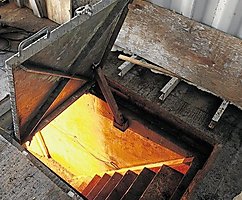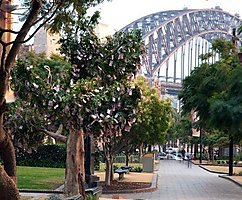Hopeless stability
 Bashny.Net
Bashny.Net
Angren: Unrelieved stability of small towns in Uzbekistan.
The fate of the Angren - one of the most vivid examples of how a developed industrial city with more than a hundred thousand population in a few years turns into a failed city, a place of social and economic catastrophe caused by the mass exodus of its inhabitants.
It arose in 1941 when, after the start of development of the coal deposits near the river Akhangaran (Angren) in the Tashkent region of Uzbekistan several villages were merged into a working village "Angrenshahtstroy." In 1946 he was awarded the status of a city and a new name - Angren.
14 photo.
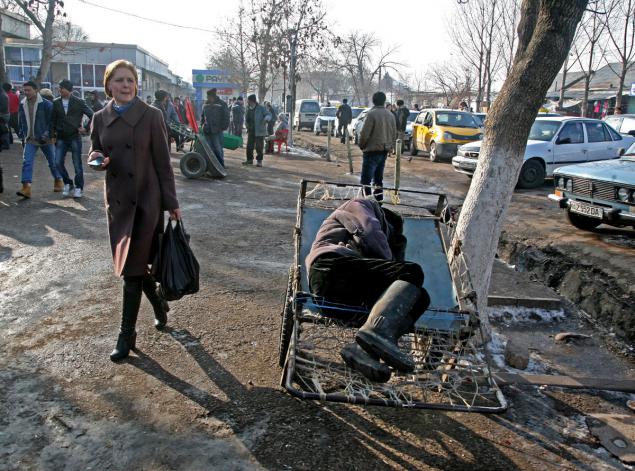
In 1950-60 the city experienced a phase of rapid growth, overgrown streets, squares and neighborhoods typical high-rise buildings.
As with all "Komsomol construction", gathered here the builders, workers and qualified professionals from all corners of the vast Soviet empire.

Many had to work here against their will: near the town was a large penal colony. Solzhenitsyn in his "Archipelago" Angren mentions in the list of cities built "on the bones of prisoners."
In 1970-80 years the city has become a major industrial center.
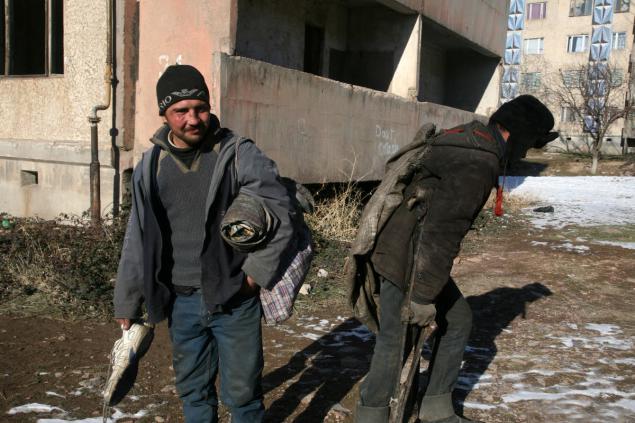
City-forming enterprises, so to speak, was a coal mine, the largest in Uzbekistan, where since the beginning of the 1940s mined lignite. But there have been built dozens of plants - cement, concrete, reinforced concrete structures, chemical, metallurgical, machine-building plants, etc. Pipes two power - Angren TPP and Novoangren - visible for many kilometers.

"Angren Rubber Rises" - style parody humor backward Soviet editorials, covering the construction of a large factory of rubber products. (The tradition is not dead: Uzbekistanskaya semiofficial press and still accompanies the article headings like "Significant steps Kungrad Soda Plant").
With the collapse of the Soviet Union it was over. In the early 1990s, it fell into production a couple of years in the homes did not gas, light, and later - just heat and water, both hot and cold. Clogged and burst pipes, sewage system stopped working.
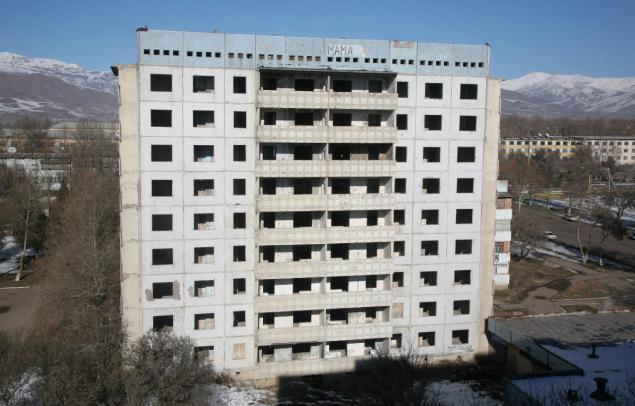
Left without jobs, electricity, gas and heat, the city population was freezing. Residents of high-rise buildings near the entrances bonfires to cook some food, warm boiled water.
General flight began. In a few years the Angren left almost all of the European population - 50-60 percent of city residents. The apartment can be bought for 100-200 dollars. From an abandoned apartment break out everything from plumbing to linoleum.

Today, as the memory of those times, the city neighborhoods are empty houses and housing nine-polurazobrannom. This is not a new building: once people lived in them.
Place left Russian, Ukrainians, Crimean and Kazan Tatars, Germans, as well as parts of themselves Uzbeks took people from the neighboring villages and the Fergana Valley.
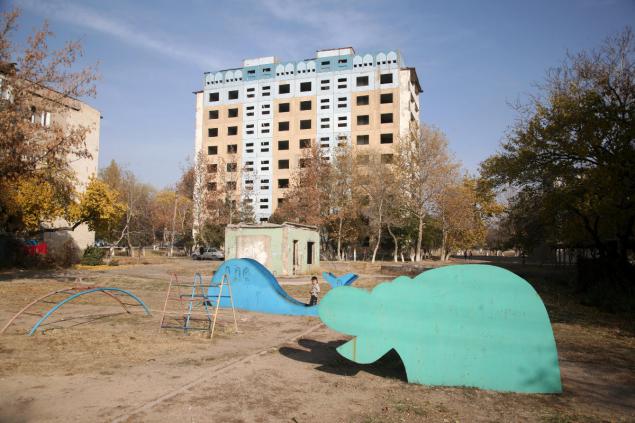
Gradually the situation to some extent stabilized. Life in Angren still barely smoldering, but her sharp deterioration does not occur.
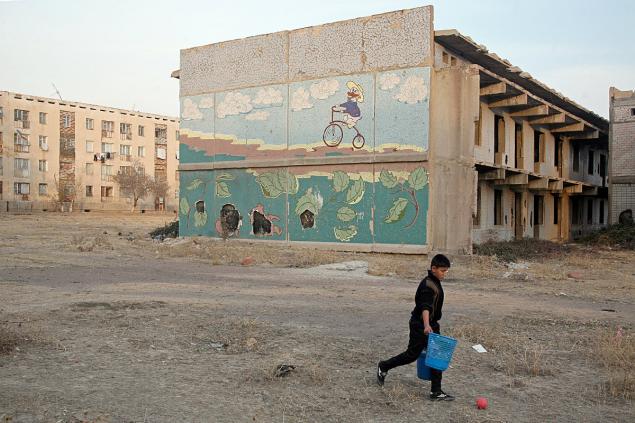
Slowly working part built in Soviet times enterprises, albeit on a small percentage of its capacity. The light is switched off periodically, but overall the situation is better than two years ago. And many high-rise buildings even had a gas.
As part of President Karimov announced in 2012 the creation of a "special industrial zone" Angren "built factories for the production of copper tubes, silicon tiles, sugar, flour.

Today Angren - a poor depressed city, barely recovered from the catastrophe the 1990 beginning of the 2000s, many of which resemble the skeletons of abandoned buildings.

According to Wikipedia, in 2005 there lived 127 thousand inhabitants, that is a little less than in 1991 when there were 132 thousand.
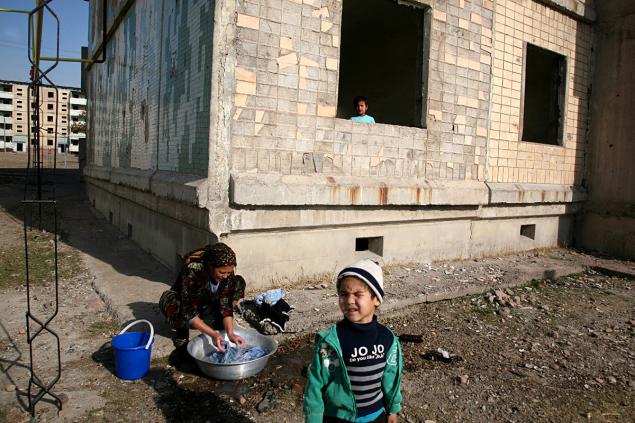
According to the official, but the private data, in 2013 there were about 5,500 Russian, 1,200 Tatars, Koreans 8-9 thousand, 26-28 thousand Tajiks, the other - the Uzbeks. This city remains largely Russian-speaking.

Residents of Angren continue to disperse without seeing for yourself here no prospects. Their road lies either in Russia, or even further prosperous Tashkent for registration "regional" tightly closed. And in place of departing residents continue to arrive towns and villages, where the situation is even worse and more hopeless.
via
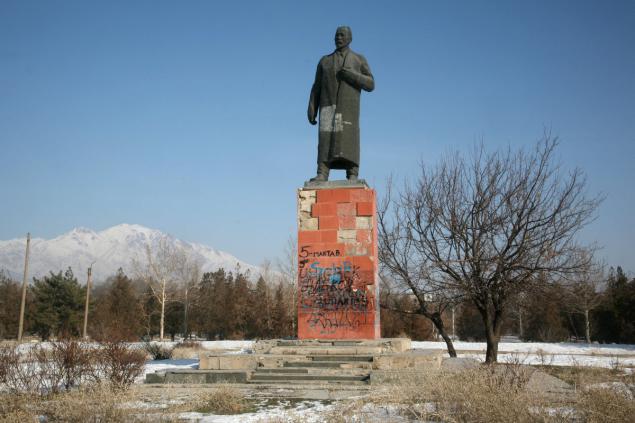
14. The final

Source:
The fate of the Angren - one of the most vivid examples of how a developed industrial city with more than a hundred thousand population in a few years turns into a failed city, a place of social and economic catastrophe caused by the mass exodus of its inhabitants.
It arose in 1941 when, after the start of development of the coal deposits near the river Akhangaran (Angren) in the Tashkent region of Uzbekistan several villages were merged into a working village "Angrenshahtstroy." In 1946 he was awarded the status of a city and a new name - Angren.
14 photo.

In 1950-60 the city experienced a phase of rapid growth, overgrown streets, squares and neighborhoods typical high-rise buildings.
As with all "Komsomol construction", gathered here the builders, workers and qualified professionals from all corners of the vast Soviet empire.

Many had to work here against their will: near the town was a large penal colony. Solzhenitsyn in his "Archipelago" Angren mentions in the list of cities built "on the bones of prisoners."
In 1970-80 years the city has become a major industrial center.

City-forming enterprises, so to speak, was a coal mine, the largest in Uzbekistan, where since the beginning of the 1940s mined lignite. But there have been built dozens of plants - cement, concrete, reinforced concrete structures, chemical, metallurgical, machine-building plants, etc. Pipes two power - Angren TPP and Novoangren - visible for many kilometers.

"Angren Rubber Rises" - style parody humor backward Soviet editorials, covering the construction of a large factory of rubber products. (The tradition is not dead: Uzbekistanskaya semiofficial press and still accompanies the article headings like "Significant steps Kungrad Soda Plant").
With the collapse of the Soviet Union it was over. In the early 1990s, it fell into production a couple of years in the homes did not gas, light, and later - just heat and water, both hot and cold. Clogged and burst pipes, sewage system stopped working.

Left without jobs, electricity, gas and heat, the city population was freezing. Residents of high-rise buildings near the entrances bonfires to cook some food, warm boiled water.
General flight began. In a few years the Angren left almost all of the European population - 50-60 percent of city residents. The apartment can be bought for 100-200 dollars. From an abandoned apartment break out everything from plumbing to linoleum.

Today, as the memory of those times, the city neighborhoods are empty houses and housing nine-polurazobrannom. This is not a new building: once people lived in them.
Place left Russian, Ukrainians, Crimean and Kazan Tatars, Germans, as well as parts of themselves Uzbeks took people from the neighboring villages and the Fergana Valley.

Gradually the situation to some extent stabilized. Life in Angren still barely smoldering, but her sharp deterioration does not occur.

Slowly working part built in Soviet times enterprises, albeit on a small percentage of its capacity. The light is switched off periodically, but overall the situation is better than two years ago. And many high-rise buildings even had a gas.
As part of President Karimov announced in 2012 the creation of a "special industrial zone" Angren "built factories for the production of copper tubes, silicon tiles, sugar, flour.

Today Angren - a poor depressed city, barely recovered from the catastrophe the 1990 beginning of the 2000s, many of which resemble the skeletons of abandoned buildings.

According to Wikipedia, in 2005 there lived 127 thousand inhabitants, that is a little less than in 1991 when there were 132 thousand.

According to the official, but the private data, in 2013 there were about 5,500 Russian, 1,200 Tatars, Koreans 8-9 thousand, 26-28 thousand Tajiks, the other - the Uzbeks. This city remains largely Russian-speaking.

Residents of Angren continue to disperse without seeing for yourself here no prospects. Their road lies either in Russia, or even further prosperous Tashkent for registration "regional" tightly closed. And in place of departing residents continue to arrive towns and villages, where the situation is even worse and more hopeless.
via

14. The final

Source:
Tags
See also
The Zipf's law in city
7 simple tips on how to live according to feng shui.
Top cities in the world to live
Ghost Towns: Spitsbergen
This Silent Hill
Post the coffee and sympathetic
The raid "Silk Road"
Robokrysy, drones hunters, talking trash: 10 gadgets and inventions that change the city
How to choose a DVR 2015: the largest online FAQ for general consumer
Why 3D headache
